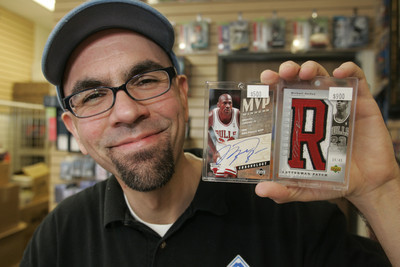EVOLUTION OF A HOBBY
When Dan Aguilar's phone rang one day two weeks ago, he couldn't talk.
"I've got a run on eBay," said Aguilar, owner of Baseball Card Heaven, a Las Vegas card shop he plans to close at the end of the month.
On this eve of the 2007 World Series, baseball card collecting isn't what it was during the hobby's late '80s-early '90s heyday.
"I've done cards for five years now and I've had a good time doing it," Aguilar says, noting he has operated in two locations during that time. "But baseball cards are not anything that anybody is going to make a huge amount of money on. You do it because you enjoy it."
But change is not such a bad thing, says Rob Vandorick, owner of All Star Baseball Cards, 35 S. Gibson Road, Suite 3, in Henderson.
Fans who found the inflated prices and mercenary fervor of 20 years ago distasteful will find a less-hyped, more financially realistic, more comfortable collecting environment today, he says.
"I love to tell my collectors: 'Come back. It's safe to get back in the water,' " he says.
The most obvious sign that Southern Nevada's card collecting landscape has changed can be found in the phone book. The Las Vegas Valley was home to nearly 50 baseball card shops at one point during the early '90s, Vandorick recalls.
Today, there are about 20 shops listed, although a few of those focus more on sports memorabilia than cards, and a few others have no working phone numbers.
Vandorick, 36, has been collecting for the past 20 years and has bought and sold cards, either at shows or his own stores, since 1991.
The hobby was "huge" then, he says, fueled largely by a phenomenon he calls "the investor cloud."
"It's a little group of people who have some extra cash to spend, cash to invest, in what they think is hot," Vandorick explains.
During the late '80s and early '90s, the investor cloud descended upon baseball cards. Collector/speculators drove up prices -- particularly for hard-to-find cards from the '60s and '70s -- and manufacturers cranked out more and more product to meet increased buyer demand.
Back then, the idea wasn't necessarily owning a piece of personal sports history. Rather, Vandorick says, it was that "all I have to do is buy something, throw it in my closet for 20 years, and I'll be sitting on a gold mine."
Problem was, everyone else had the same idea. In the end, so many cards were printed and so many cards were saved -- put into protective albums instead of being handled or used -- that their values didn't rise nearly as much as collectors had hoped.
"As a result," Aguilar says, "what they were investing in became almost worthless."
Then, as the '90s wore on and the boom faded, card companies "started listening to collectors," Vandorick says. "They said, 'We want some collectibility, not a million copies of this card. We want something that's going to hold some value in the future.' "
Manufacturers responded.
"Companies, instead of making a million cases of two products, make maybe 10 or 20 different products and maybe make only a couple thousand of each product," Vandorick says. "They've built in some collectibility."
In another encouraging sign for the hobby, baseball fans -- some of whom had drifted away after the 1994 strike -- began to return to card collecting because of what they were seeing on the field.
In 2001 "it all really came full circle," Vandorick says, and the major league debuts of Albert Pujols with the St. Louis Cardinals and Ichiro Suzuki with the Seattle Mariners lit up the hobby.
"That's when we really started to see the big turnaround, back in 2001."
The new environment is "better for the hobby because people can go back to collecting the best cards (at) better prices," Aguilar says.
The Internet -- particularly eBay -- has changed the dynamics of card collecting during the past decade or two. Collectors can buy, sell and trade cards without having to leave their homes, as well as choose from among a larger online inventory than any brick-and-mortar store could ever hope to stock.
But Aguilar doesn't blame the Internet for the demise of his shop.
"The reality is, the Internet isn't going anywhere," he says, adding that the business is evolving just as the music business is with the advent of online music stores.
On the upside, Vandorick uses the Internet as part of his business. "In fact, we probably sell more cards, just single-item cards, over the Internet to other states than we do in-state here," he says.
But his store also has collectors who stop by to pick up packs of cards, and those collectors have more product to choose from than ever. Card companies now sell everything from cards made from players' jerseys to autographed cards to cards for modern players made to resemble cards of generations past.
"There are so many things on the market now to pique collectors' interest," Vandorick says.
Speculators are still there, he adds, but they're more apt to frequent eBay than the card shop.
"The people I have coming in my shop are the true collectors for the most part," Vandorick says.
Vandorick is happy to sell to anybody who's looking for a big financial score. But, he says, "it's more exciting when a 10- or 12-year-old boy or girl comes into the store to buy a couple of packs."
In fact, he adds, "if there has been anything that has surprised us over the past year, it has been the amount of kids getting back into collecting sports cards.
"I'll never turn a sale away. We're in business to stay in business," Vandorick says. "But, in the same light, it's just good to see the investor cloud doing something else."
Contact reporter John Przybys at jprzybys@ reviewjournal.com or (702) 383-0280.

















